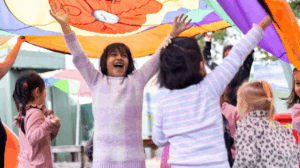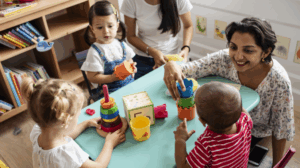Family finds safety and belonging at Child and Family Hub
Mandy and her family find community and a place of safety at Taree’s First Steps Count centre, a Child and Family Hub which helps families navigate the services they need.
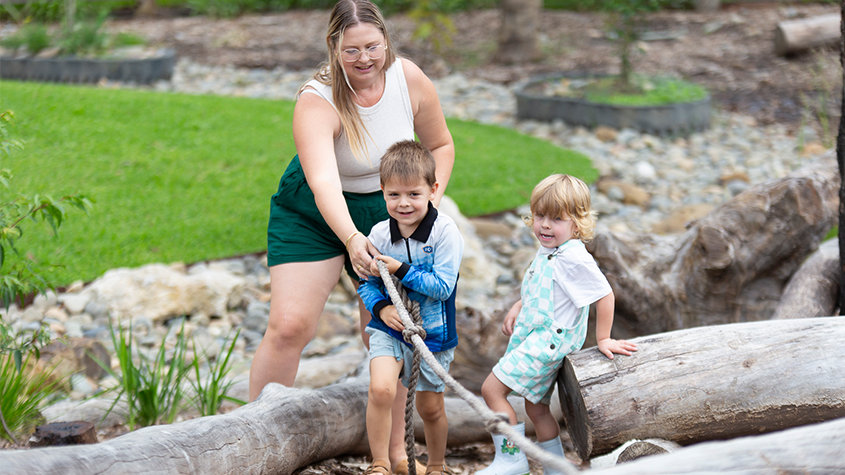
There’s nowhere else around here that is this safe for them all and you know they’ll be okay.”
“I was too scared to access any [services] before. I was scared that it would be a place where everyone would watch your every move and that people would report us again,” says Mandy,* mother of seven children under 11, who regularly uses the First Steps Count (FSC) Child and Community Centre in Taree on the mid north coast of NSW.
“We started coming here right after the children came back into our care after being removed and it gave us a safe place to be with them.”
“There’s nowhere else around here that is this safe for them all and you know they’ll be okay.”
The centre is a thriving Child and Family Hub on Biripi country, for families with children aged 0-12 offering activities and programs in a safe and welcoming environment. Families can connect, play and access the health and wellbeing support they need – all in one purposely-designed, beautiful place.
The model is similar to the Early Childhood Hubs advocated for by SVA that provide high-quality integrated supports to children aged between birth and six-years-old experiencing socio-economic vulnerability.
SVA advocates for a national, early childhood development policy framework and service system that provides high-quality integrated supports in the form of Early Childhood Hubs to children experiencing socio-economic vulnerability from birth to six-years-old.
In the first six months of 2025, 436 families, with about 1211 children have come through their doors 75% of these children are under 5, and 35% are Aboriginal and Torres Strait Islander peoples.
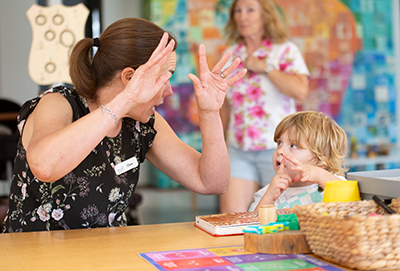
Clare Brennan, the Centre Director, speaks of the negative experience many people have had accessing services in the area. “There can be stigma and judgement attached to the issues with which people present. With so many services it can be difficult to work out where to find help, rigid eligibility criteria, issues with cultural safety, transport barriers and waiting lists.
“I’m really proud of what we’ve achieved here. It’s a different way of working. The key thing I’m seeing is the relationships that are being formed with families that start to build the trust in accessing supports and services.
“A family might come and play, and then after a year, they might ask for help.”
The centre is not a childcare centre. Rather it hosts an extensive range of services and programs such as play groups, Wellbeing for Kids and parenting programs. Many of the programs are delivered by Uniting NSW/ACT, whose Youth, Children and Families team is co-located at the Hub, with other local service providers delivering their funded programs in the welcoming spaces.
Other organisations are present on an ongoing basis while others rent spaces as needed. Consult rooms are popular with allied health workers offering speech therapy, physiotherapy, counselling and occupational therapy, in an effort to meet with high demand for these services in the community.
It’s through the relationships with Toni and Victoria that the families build trust.”
The small hub team of Clare and Toni Carson, the full-time Centre Leader (Operations), part-time Office Manager and part-time Volunteer Coordinator, is augmented with a ‘Navigator’ role, funded independently by Communities for Children, employed by Karitane. As the Navigator, Victoria Schumann helps families navigate the system by making warm referrals and connecting families to the services they need.
“It’s through the relationships with Toni and Victoria that the families build trust,” says Clare.
Another key element of the hub is having some of the service providers working in the communal areas such as a physiotherapist giving a session in the outdoor space. This allows children to access therapies in natural contexts and also provides opportunities for families to engage with and understand more about the hub and connect with the teams on-site.
“We’ve discovered it’s important to find people who are willing to be flexible and work in this way. It looks different. The most impressive are workers who are out on the floor with their laptops, not in offices and behind desks.”
Mandy has been coming since soon after the centre opened early in 2023. “At first we came for the free play with the kids, somewhere to get them out of the house and have fun with their friends,” she says. “Now it’s the sense of community that keeps us coming back.”
Mandy says she and her family have accessed everything including intensive family preservation program, the homework club run by The Smith Family, HIPPY, a home-based early learning program which supports parents in preparing their children for school, and a gardening group, to name a few.
“We feel we belong somewhere,” says Mandy. “Everyone is welcoming and makes us feel like family. The children have grown up here feeling secure.”
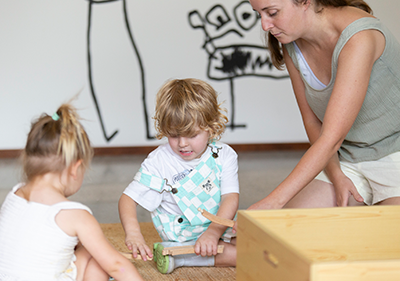
SVA research, conducted with Mitchell Institute and Deloitte Access Economics, has identified communities across Australia with high levels of early childhood disadvantage and a lack of early childhood education and care services. Rural and regional communities are overrepresented in this data. Taree has high levels of early childhood disadvantage, with 19% of children under 6 estimated to be experiencing significant disadvantage.
Situated in Manning Gardens, a low socioeconomic area in Taree, First Steps Count is within easy reach of a local housing estate, schools, and next door to a daycare centre.
“Location has played a good part in the success of the hub,” says Clare. “It’s accessible to those who need it most.”
This is more and more about parents being able to connect and focus on parenting. But it’s the children that benefit.”
As an experienced Social Worker, Toni is a Victims Support counsellor. As part of her role as Centre Leader, she works with parents who have experienced traumatic events in their life to address together the impact of the trauma.
“In this region there are high levels of domestic violence, intergenerational trauma and poverty. First Steps Count aims to provide individual, group and community development support, to work in partnership with families to overcome the impact of trauma.”
The centre is exploring opportunities to become a specialist in trauma-informed practice.
Although the centre started out with children as the focus, Clare says that it has evolved. “Children don’t exist in isolation. This is more and more about parents being able to connect and focus on parenting. But it’s the children that benefit.”
Two-year old Octavia,* one of Mandy’s children, wouldn’t talk to anyone when she first came to the centre.
Through a student speech pathology program facilitated by the University of Newcastle, she accessed speech therapy which provided screenings and parent education for children in the Little Explorers playgroup.
I’m not a depressed potato at home anymore. I come to groups, and I have friends I can talk to.”
The strategies they provided gave Mandy confidence.
Improvements in Octavia’s speech and language resulting from the speech program and regular exposure to other children and language models at FSC means that “now she likes to make new friends,” says Mandy.
“She laughs and introduces everybody. She feels at home.”
For Mandy, it means she’s not feeling alone and isolated. “I’m not a depressed potato at home anymore. I come to groups, and I have friends I can talk to.”
*Not their real names.
First Steps Count Child and Community Centre
First Steps Count is a child and family hub for children aged 0-12, where families can connect, play, and access the health and wellbeing support they need – all in one beautiful place. The Centre was thoughtfully co-designed with the local community for over 10 years with extensive community engagement to inform the design and model of the Centre.
Capital works funding for the building was provided by the Vincent Fairfax Family Foundation, NSW state Government and the Australian Government. Stage 1 of the Centre opened in 2023 and First Steps Count has been fully operational since March 2024. The Paul Ramsay Foundation provided three years of start-up operational funding which will end in 2026.
To learn more: www.firststepscount.org
About SVA’s Early Years work
SVA knows that the current system of support for young children and families is fragmented and lacks integration, making it difficult for families to access the resources they need. We believe all children should be able to access high-quality early childhood education and care, regardless of where they live or the challenges their family is facing.
SVA advocates for Integrated Early Childhood Hubs as part of a national, early childhood development policy framework and service system so that more children particularly those facing socioeconomic disadvantage are able to benefit from integrated models. The Hubs support children and families to build connections and social networks. They also provide access to a range of key services including allied health services and other supports.







